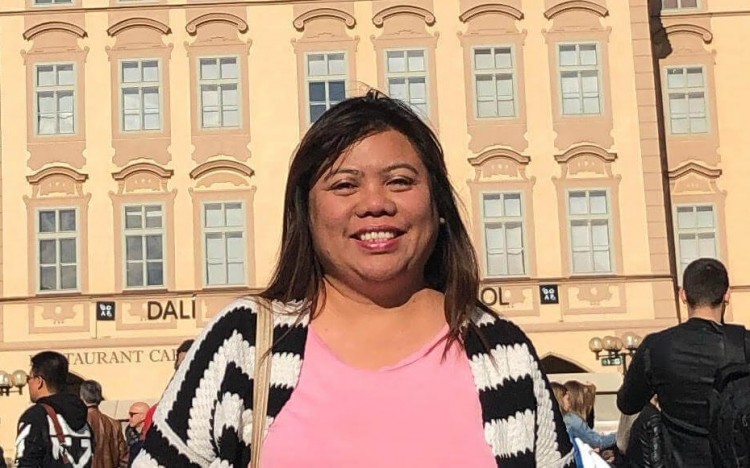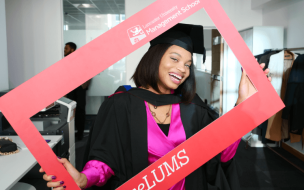Fe Mae Dawn Chico has 12 years of experience in business. But a seven-day trip to the Czech Republic completely changed her perspective
Fe Mae Dawn Chico has 12 years of experience working in finance. Yet a seven-day trip to the Czech Republic as part of her MBA degree completely transformed her outlook on management.Structured within 's International Business in Context module, Fe Mae Dawn travelled to Czech’s capital city with her class in May.
The aim of the trip was to learn first-hand about Prague’s economy and local business culture. Each day presented a new learning opportunity.
Why Prague?
Prague has a unique history and socio-economic environment. It was controlled by communist leaders for just over 40 years in the 1900s and is now one of the fastest growing economies in the European Union.
Prague’s unique history remained a constant theme throughout the trip. Fe Mae Dawn and her peers were introduced to local speakers like Radek Spicar, the vice president of the Confederation of Industry, who discussed his experiences during the time of communism and how the nation transformed into a democracy.
They also visited the Museum of Communism and Terezin Little Fortress, a concentration camp during World War II.
“It was a very big eye opener,” says Fe Mae Dawn. “Seeing history unfolding in front of your eyes is very beneficial in your personal development, as well as your professional development.
“I really understood how the communist era had affected them and how World War II had affected their ideologies. For me, the most important takeaway is that our decisions have an effect on the welfare on everyone around us.”
Understanding a new market
Fe Mae Dawn has experience interacting with individuals from all over the world, having previously worked with AccorHotels in Singapore.
However, the way Czechoslovakian professionals operate wasn’t something she was familiar with.
80% of the companies in the Czech Republic have foreign ownership. During the trip, the MBA students toured these multinational companies including Skoda Auto and Coca Cola HBC.
The tours, and lecturers within them, focused on how these companies co-operate across various businesses worldwide. Students were also exposed to the relationships and dynamics between a parent company headquarters and its operations in the Czech Republic.
“In the Czech Republic, they’re more intuitive,” she says. “They don’t prepare for long term planning because they were not taught about that.
“In Skoda for example, the Germans do things according to plan. However, if things don’t work out according to these plans, they would most likely will panic.
“The Czech people, since they learned how to survive in whatever way possible during communism, were very talented and excelled in their workplace, even with no proper planning.
“It’s a good combination of skills between Germans and Czechs in Skoda because they complemented each other.”
The value of an international trip
On the last day of the trip, Fe Mae Dawn and her classmates had a debrief and reflection session.
She says the Prague trip provided a better understanding of international business than just sitting in a lecture hall would have. It’s an experience, she continues, that’s opened her mind to new ways of thinking.
“I learned that I should make it a habit to have a regular critical reflection to enhance my decision-making ability, and one of the biggest hindrances that I must overcome to become a successful leader is my personal attitudes,” Fe Mae Dawn explains.
“[When we graduate], we will be working with a multinational environment wherein our colleagues will be from different races and religious backgrounds. It’s essential for us to be open minded, so we can live in harmony amidst adversity.”
Student Reviews
Lancaster University Management School
An exceptional educational establishment in the North West of England.
This university has been a fantastic life experience as well as a great academic one. I first decided to go to Lancaster University Management School due to its exceptional business education facilities and have not been disappointed. I recommend the university to anybody that wants to put themselves in a strong position for a career upon graduation.
Student Ambassador
Overall, the instruction is decent, however it also depends on your department. The people are friendly, in my opinion. The sporting events are enjoyable, and there is a good sense of community. Although the city is quite remote, it is nonetheless attractive.
Lancaster University honest review
The education system in the university is excellent especially that of the Management School. The campus has great facilities for students to study and live in a relaxed manner. The students can engage in various activities through the socities.
Great opportunities to think beyond
Lancaster University provides a lot of good opportunities to think beyond.There Entrepreneurship in residence program helps students to meet and seek guidance about entrepreneurship and the challenges.Their Work in progress program help to fabricate your startup idea and further to pitch to the potential investors.Apart from that there are lot of programs like Enactus, guest lectures and guidance from seniors to help and shape your career needs.
They provide lot of opportunities to shape up your employability skills.
A top university in the UK for management science!
If you’re interested in management science studies, Lancaster University is one of the top universities in the UK. The faculty is renowned and have a sterling reputation for research in management science. Candidates specifically interested in Forecasting would find the Centre for Marketing Analytics and Forecasting especially relevant to their field. Besides, the ROI is good as the overall cost compared to other universities is less.
Great university for academia – not great for 'entrepreneurs'
Please keep in mind that my review is nuanced by my expectations of an Entrepreneurship degree :) I came to Lancaster University because it was one of the top universities to have a course in Entrepreneurship. After 4 years in this degree, my most valuable experience has been my placement and not the actual course. The course is heavily focused on impractical elements, which is a bit odd for an Entrepreneurship degree. There are some modules that involve hands-on work but the faculty support for such things has not been great. My course also involved a lot of teamwork which has been fantastic and really prepared me when it comes to dealing with the diversity of opinions. In terms of career prospects, the management school does A LOT to host events, workshops and support sessions to help you build up your employability skills. Although, I wish there was more acknowledgement of SMEs/startups as a viable career option. The entrepreneurship team which is meant to support budding businesses is really stepping up their game with tons of guest speakers, workshops and pitching opportunities. The location is a concern if you're not in STEM, Law or Accounting and Finance. Business requires networking with the broader community. However, for Lancaster students, the best bet is a trip down to Manchester or London. On the flip side, living in Lancaster is much cheaper! Overall, if the purpose of your university experience is to receive top academic education and have great facilities at your disposal, Lancaster is a great choice. But if you want to be in business and entrepreneurship, I would look elsewhere.







